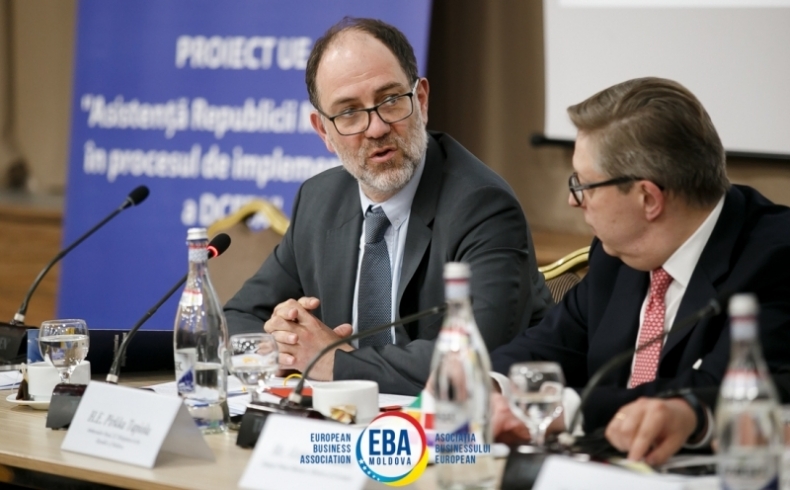On April 6, EBA has presented its annual Business Issues Briefs document, in which key business environment issues affecting private sector development were described. The document was developed by EBA, in cooperation with the EU funded Technical Assistance DCFTA Project.
The panel discussion was led by Mr. Petros Sourmelis, Head of Unit at DG Trade within the EU Commission, Mr. Pirkka Tapiola, EBA Honorary President and EU Ambassador to the Republic of Moldova, Mr. Octavian Calmac, Deputy Prime Minister and Minister of Economy, as well as by Mr. Thomas Moser, EBA President and Mrs. Mariana Rufa, EBA Executive Director. Among the attendees of the event were representatives of the private sector, public authorities, international organisations and diplomats.
The purpose of the document is to present the key issues that the private sector is facing in Moldova, with more sectors having been covered for this year’s edition. Mrs. Rufa underlined that the goal of the association was to develop a brief document, but with concrete issues, under particular sectors and with specific examples Mr. Moser presented the main points of the document, covering areas of political and macroeconomic stability, legal, tax and customs framework, rule of law, infrastructure, access to financial services and human resources. It is important to mention that some of the reforms that have been undertaken at the beginning of this year have started to cover some of the identified issues.
Mr. Tapiola reiterated the need to take such a discussion seriously and not just focus on the transformation of goods, but of the quality of life in the country. Mr. Calmac mentioned that besides listening to the problems of the sector, solutions need to be also identified, so as to comply with the international commitments. Mr. Sourmelis reminded that the EU remains the main financial and trade partner of Moldova, with European standards allowing Moldovan products to compete on other international markets too. However, he remarked that governance issues need to be tackled for the situation to be considerably improved.
The participants thanked EBA for offering a holistic approach to the problems and expressed their openness to further implement DCFTA and work together to ensure a sustainable economic growth.




























